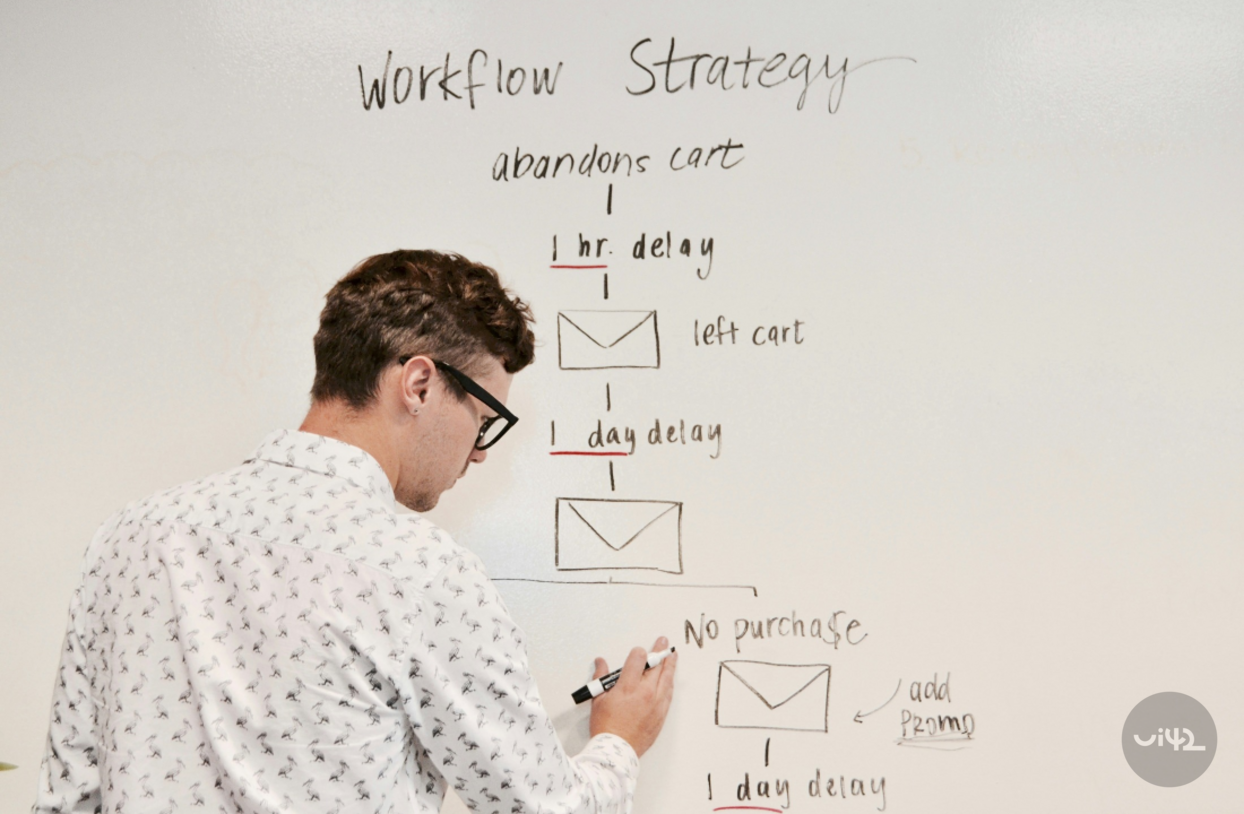Successful scaling of your e-commerce business requires more than just increasing investments. By implementing these five fundamental strategies, you can focus on more efficient use of existing resources and building stronger relationships with customers. The result will be sustainable growth of your business and increased profits.

5 Foundations for Properly Scaling Your E-commerce Business
E-commerce is experiencing dynamic growth and grows by 20 to 25% year over year. This represents a huge potential for those who want to make their mark in this lucrative industry. The larger your business, the easier it is to generate significant profits, build a strong brand, and efficiently utilize available resources. Scaling allows you to become a stronger player in the market and more easily compete with others.
How to scale an e-commerce business?
In this article, you will learn about 5 key strategies that will help you successfully scale your e-commerce business and thus achieve sustainable growth and prosperity.
But how can you kickstart rapid scaling of your business? Before you dive in, it's important to distinguish between "scaling" and "business growth."
Scaling vs. Growth
Business growth means increasing resources such as employees, product lines, or capital investments at the same pace as sales are growing. Generated sales match the investments in selling a larger volume of products, leading to business growth, but not necessarily profit.
On the other hand, scaling means increasing revenues with minimal additional resources. In this case, you would increase sales while your overhead remains relatively the same. For every new business, increasing revenues is attractive. Therefore, scaling should be your ultimate goal. To achieve this, you need to get the most out of existing resources.
1. Online marketing as the key to growth
The world of e-commerce is rapidly evolving and with nearly 35% of the global population making up digital shoppers, it is important for e-commerce business owners to focus on scaling their business. After all, the more the business scales, the easier it is to build a strong brand and generate conversions. The foundation of a successful e-commerce business is effective online marketing. By using engaging and relevant content on various platforms such as Google, Meta, and social networks, you can attract prospects to your online store and convert them into paying customers.
Attract and engage.
Create valuable and relevant Brand content that appeals to your target group. Optimize your website for search engines (SEO) to rank at the top of search results. Leverage the power of social networks to build a community and promote your products. Set up performance campaigns in Google PPC Ads. Performance campaigns are an automated type of campaign in Google Ads that use machine learning to display ads across various Google networks. This includes the Search Network, Content Network, YouTube, Gmail, Maps, and Discovery.
Convert visitors into customers.
Design an intuitive and user-friendly design of your website that facilitates purchasing. Don't forget about UX and CX. Offer various payment and shipping options to meet your customers' needs. Use remarketing tools and email marketing to reach potential customers who have left your website without making a purchase.
Analyze and optimize:
Monitor and analyze sales and marketing data to gain valuable insights into your customers' behavior. Optimize your campaigns based on data and experiment with different strategies to achieve maximum return on investment (ROI). Investing in online marketing will pay off many times over in the form of growth of your e-commerce business. Remember that online marketing is an ongoing process that requires constant monitoring of trends and adaptation of strategies. Get ahead of the competition and kickstart your e-commerce business with an effective online marketing strategy!
2. Embrace automation:
Scaling an e-commerce business requires a lot of effort. There are several tasks that are beyond your capacity and completing them takes more time than you would like. If you want to scale your online business, automation will help you save time and resources that you would otherwise have to invest in these tasks. This way, you optimize resources and free up time for important tasks such as creating marketing campaigns and content.
AI chatbot Your tireless partner for e-commerce
A chatbot supported by ChatGPT 4 will revolutionize your customer service, marketing, and sales: at ui42, we will connect your chatbot to ChatGPT 4 simply via API and enable it to communicate smoothly and obtain real-time responses. Your virtual assistant is always available to answer customer questions and provide support. Simplify the lead generation process and effortlessly collect contact details of potential customers. Provide multilingual support and adapt to a global audience. Your chatbot is constantly learning and updating its knowledge, allowing you to keep up with the latest trends and customer requirements. Provide your customers with an exceptional experience and take your e-commerce business to a new level.
Automated product recommendations
Automated product recommendations are a big benefit for e-shoppers because they allow you to offer customers products they might like even before they make a purchase. Using an AI-based recommendation tool can therefore help you improve customer relationships and increase sales. So if you want to increase the success of your e-shop and improve the shopping experience for your customers, implementing this tool could be a big plus for you.
3. Strategically outsource.
Following on from the previous point about automation, there are several other business tasks that you can outsource to experts. Similarly, if you lack internal expertise, technical tasks such as best practices SEO or complex migration CMS, (linking CMS to ERP) are best left to third-party experts. Outsourcing such tasks allows you to scale your business while saving your time for other areas of the business.
Similarly, when scaling your e-commerce business, you should stop manually picking, packing, and shipping products. Instead, hire a fulfillment company that will store products and fulfill all received orders. These services will save you significant shipping costs, as you will no longer pay for packaging, postage, and fuel for trips to and from pickup points.
4. Prioritize exceptional customer satisfaction
customer service
Given the rising costs of customer acquisition, retention is a priority for e-commerce businesses. Poor customer service is one of the main factors contributing to customer churn today. A Zendesk research report found that 87% of customers will share a good experience with others, while 95% talk about bad experiences. Therefore, when scaling your e-commerce business, it is wise to strengthen customer service initiatives. Customers should be able to quickly and easily get answers to their questions. Build a versatile customer support team that allows you to address issues before they lead to complaints and negative reviews.
Speed of CMS
Website speed is alpha and omega in e-commerce. Customers are more likely to shop on sites that load quickly. A fast website means better SEO ranking, higher customer satisfaction, and ultimately higher sales.
Like the online furniture store Kondela, you too can focus on optimizing the speed of your e-commerce website. Image compression, code minimization, and using cache for repeat visitors are just some of the tools that will help you speed up your website and thus improve the overall customer experience. Invest in a quality and fast CMS system, regularly optimize your website, and don't forget to use speed measurement tools. Speed will certainly pay off in sales results.
Communicate with your customers
Simply put, you need to offer your customers several ways to get the information they need. At the same time, don't forget about the various options for contacting you. And if a customer or potential customer does get in touch, don't forget to respond promptly. After all, up to 90% of customers state that a prompt response is important to them.
5. Retention strategy for keeping customers:
In e-commerce, retaining customers is 5 times cheaper than acquiring a new one. Therefore, increasing customer retention rates is a reliable way to achieve profit.
In addition to providing exceptional customer service, here are a few effective tactics to support customer retention:
Encourage customers to register on your website.
Customer accounts are proof of a customer's long-term commitment to the brand. They facilitate repeat purchases and offer customers instant access to previous orders and their status. However, most customers prefer to shop as guests because it is quick and convenient. So how can you encourage customers to create a customer account? Lead them to registration after the first purchase. Send direct invitations to your first-time shopping customers and ask them to activate their account after the transaction. Motivate them with a retention discount, which is cheaper than acquiring new customers.
Introduction of a loyalty customer program
Loyalty programs are an effective tactic to encourage shoppers to repeat purchases or increase the frequency of their purchases. The rewards offered are an incentive for customers to shop and earn valuable points.
Look at how the online store with children's goods www.feedo.sk rewards its customers when they shop for a certain amount. By joining the "Feedo club," customers can get more value with each purchase, while the store profits from repeat purchases.In an ideal case, you should offer them welcome points for registration. This encourages shoppers to create a customer account. Moreover, they appreciate how easy it is to earn rewards, which inspires them to return to your e-commerce store.
Most e-commerce platforms (such as Shopify) offer store overviews, which allow you to see the best customers by order value and frequency. Use this information to reward deserving customers.
Send engaging emails
An email marketing strategy is fundamental for acquiring and retaining customers. Use this medium to build a strong relationship with your audience before and after purchase. It is important to send emails with added value, otherwise, you risk ending up in the spam folder.
Look at how the online store www.kodela.sk sends personalized emails to its customers. The email not only contains a discount but also personalized content based on AI recommendations. through the AI tool Bloomreach.
how to send engaging emails to your customers
-
Send follow-up emails a week after purchase and thank the customer for their business. This makes the customer feel good about their purchasing decision.
-
Send content with added value, such as guides or tutorials related to using the product.
-
Recommend products that complement the original purchase. This increases the chance of a repeat purchase.
-
Share customer reviews. This will work as social proof for your customers and encourage them to stay loyal to your brand.














